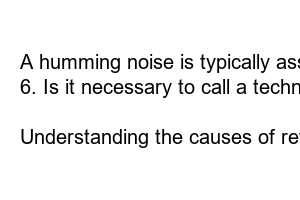냉장고 소음 원인
Title: Unveiling the Mystery: Common Causes of Refrigerator Noise
Introduction:
Refrigerators are essential appliances that have become a staple in every household. However, one frustrating aspect of owning a refrigerator is the noise it can produce. This blog post aims to shed light on the common causes of refrigerator noise, helping you diagnose and address the issue effectively.
Subheadings:
1. Compressor Problems:
A faulty compressor is often responsible for the bulk of refrigerator noise, with issues like a worn-out motor, loose components, or malfunctioning valves causing the compressor to vibrate excessively, resulting in loud noises.
2. Improper Alignment:
Improper installation or misalignment of the refrigerator can lead to unwanted vibrations and noise. Uneven distribution of weight or instability can cause the refrigerator to move, creating rattling sounds that persist even when the unit is running normally.
3. Faulty Fans:
Refrigerators use fans to circulate air and maintain optimal temperatures. Over time, these fans can accumulate dust and debris, causing an imbalance and resulting in irritating humming or whirring noises.
4. Damaged Evaporator Fan Motor:
A damaged evaporator fan motor, responsible for circulating cool air within the refrigerator, can produce loud noises if the blades become bent or if the motor itself is malfunctioning. These noises tend to persist and worsen as the motor wears down further.
5. Faulty Condenser Fan Motor:
Similar to the evaporator fan motor, a malfunctioning condenser fan motor can generate noise when its blades become loose or the motor itself is damaged. These noises can range from humming or grinding sounds to continuous rattling.
6. Expanding and Contracting Pipes:
As the refrigerant flows through the pipes, it can cause expansion and contraction, resulting in distinct popping or cracking sounds. Although this is normal, excessive noise can indicate an issue with the refrigerant or the insulation around the pipes.
FAQs:
1. Can refrigerator noise be reduced or eliminated?
By regularly cleaning and maintaining your refrigerator, you can minimize noise. However, some sounds are an inherent part of the appliance’s operation, so complete elimination may not be possible.
2. How can I fix a noisy compressor?
Consulting a professional technician is recommended for repairing a faulty compressor, as it requires technical expertise. However, ensuring proper cleaning and maintenance can help prevent compressor noise.
3. What causes a refrigerator to vibrate excessively?
Improper leveling, weak floor support, or worn-out components can cause excessive vibrations. Addressing these issues can help reduce vibration-related noise.
4. How can I prevent excessive noise during defrost cycles?
Regularly defrosting your refrigerator can prevent ice build-up, which can cause loud cracking or popping noises during defrost cycles.
5. Why is my refrigerator making a humming noise?
A humming noise is typically associated with the fan motors. Cleaning or replacing the fans can resolve this issue.
6. Is it necessary to call a technician for all refrigerator noise issues?
While some noise issues can be resolved through simple maintenance, it is advisable to seek professional help if you are unsure or if the noise persists, as it may indicate an underlying problem.
Summary:
Understanding the causes of refrigerator noise is crucial for maintaining a quiet and efficiently operating appliance. By inspecting and addressing issues related to the compressor, alignment, fans, motor, and refrigerant, you can minimize and resolve noise problems effectively. Remember, regular cleaning and maintenance play a significant role in ensuring a noise-free refrigerator.

